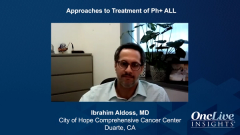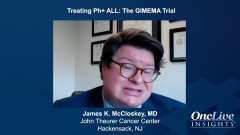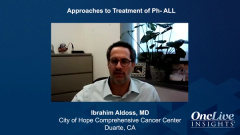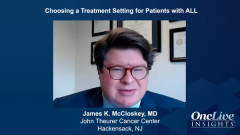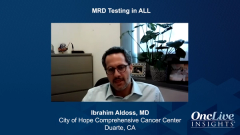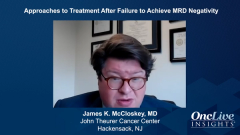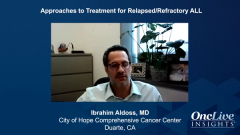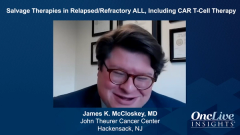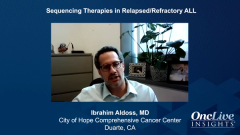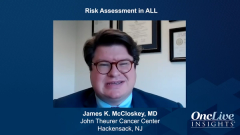
Approaches to Treatment of Ph+ ALL
A discussion on how to approach the treatment of a pediatric or AYA (adolescent and young adult) patient with ALL (acute lymphoblastic leukemia) who is Philadelphia chromosome positive (Ph+ALL).
Episodes in this series

Ibrahim Aldoss, MD: Dr. McCloskey, now, moving to the Philadelphia chromosome-positive ALL [acute lymphoblastic leukemia], how did this evolve recently with the introduction of tyrosine kinase inhibitors (TKIs), and does it make a difference if the patient is pH-positive or negative when you choose your initial therapy? And with a focus more on the Ph-positive in this section, we'll talk more about the pH negative later.
James K. McCloskey, MD: This is a quickly evolving area of ALL. And certainly in adults, it's the Wild West. We haven't established a clear standard. And, it's interesting. You could make the argument for a variety of therapies from steroids and TKIs [tyrosine kinase inhibitors] alone, which certainly is appealing in elderly, less-fit patients—TKIs and steroids in combination with some reduced-intensity chemotherapy and then TKIs with chemotherapy. More recently, this idea of even just TKI with immunotherapy or blinatumomab, which looks impressive. One of the important things to note is that clearly, we have at times, especially early in the disease history, underestimated the heavy lifting that the TKI does. And TKIs are really important to utilize for these patients. And then in the community, particularly in the second lines and later, please remember to look for resistance patterns because I know sometimes we see that patients are continued on TKIs without having resistance testing. And we know those patients, just like in your CML [chronic myeloid leukemia] folks, can develop resistance. For us, we use a combination of these approaches for younger, fit patients. We do use chemotherapy—a hyper-CVAD [cyclophosphamide, vincristine, doxorubicin]-like regimen in combination with TKI as frontline therapy. And then we deescalate from there if patients are less fit or elderly. One of the interesting things I think about where we stand today, especially in children, is the role of transplant, and that's evolving quickly. And starting with some heated discussions between us and the transplant people here, the pendulum is starting to shift back towards potentially not transplanting, particularly young patients who have a quick MRD [minimal residual disease] response with a TKI-based chemotherapy combination approach. And I don't know how you were handling that there, but many of us are looking forward to a time when maybe we won't transplant all these folks with Ph-positive ALL.
Ibrahim Aldoss, MD: I agree with you. This is the hope eventually. Can we really optimize the frontline setting to avoid a transplant in these patients? As adult oncologists, we continue to recommend transplants. Now there is some evolving data that is very encouraging, and an interesting part of it is early molecular response (EMR), where it seems these patients are doing well and potentially have durable remissions without transplant. The other part, the introduction of ponatinib early in the course of Philadelphia chromosome-positive ALL, at least in single-center data from The University of Texas MD Anderson in Houston, Texas, the introduction of ponatinib to very high molecular response early on, and at least with a shorter follow-up, they haven't seen a difference in patient who went to transplant or not. However, the rule of the transplant in this setting, is it's still early to have a conclusion. We must have more study and know exactly which patient can be spared from the transplant. But as you mentioned, the Ph-positive ALL has evolved significantly with the introduction of TKIs. Previously, the challenge with Ph-positive before the TKIs was to get them into remission and to have durable remission, to blend the transplant. And the majority of patients, they tend to relapse while you try to do the transplant. Now, with the TKI, I would say close to 100% achieving complete remission at spine morphology, molecular response is less frequent, and second-generation TKI. And then the question of the intensity of chemotherapy: How much intensity do you need for chemotherapy? That is a frequent question in this setting. I would say most of us try to avoid giving asparaginase to adults because the concern is you may end up with toxicity that interrupts the more important drug, which is the tyrosine kinase inhibitor. The question of hyper-CVAD is would you use it as a front line or not? And you must remember, in this study, the first cycle was reduced intensity after that patient went to hyper-CVAD after the first cycle. And although medical response was the same, the problem was that more patients had treatment-related mortality with the more intense regimen. And there are other studies, especially in older patients. The approach now, not to intensify the chemotherapy, you can get a very good response just with a TKI and steroids and increase in plus or minus.
James K. McCloskey, MD: To piggyback on that, there’s also exciting new data looking at adding some of these therapies that we use in relapse and refractory patients earlier on in treatment both in the adult and the pediatric world. You mentioned the MD Anderson Group; they have a lot of experience with ponatinib and many of us have recognized the role of ponatinib for these patients. At ASCO [American Society of Clinical Oncology meeting] this year, we did see data looking at ponatinib and BLINCYTO® [blinatumomab] as first-line therapy in patients with Ph-positive ALL. It’s certainly early and it's a small study and a heterogeneous abstract of patients that also included some relapse and refractory patients. But to your point, the patients who were frontline had 100% response rate, all the CRs were MRD negative and none of those patients proceeded to transplant. We look forward to moving these later line therapies that we use for relapse into the frontline setting and Ph-negative ALL, they have a lot of potential in the frontline setting as well.
Transcript Edited for Clarity


